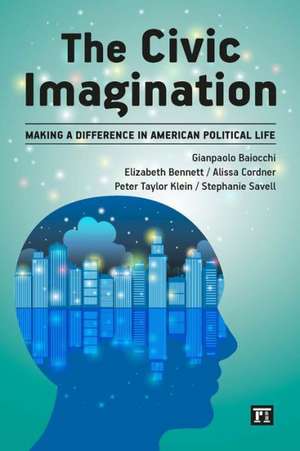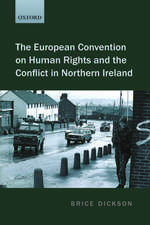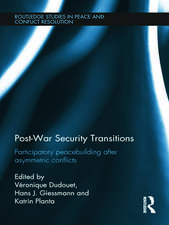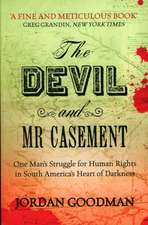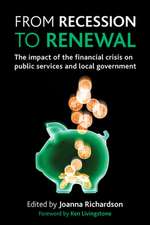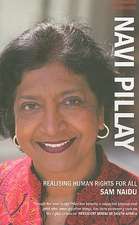Civic Imagination: Making a Difference in American Political Life
Autor Gianpaolo Baiocchi, Elizabeth A Bennett, Alissa Cordner, Peter Klein, Stephanie Savellen Limba Engleză Paperback – 30 apr 2014
| Toate formatele și edițiile | Preț | Express |
|---|---|---|
| Paperback (1) | 362.05 lei 43-57 zile | |
| Taylor & Francis – 30 apr 2014 | 362.05 lei 43-57 zile | |
| Hardback (1) | 1106.81 lei 43-57 zile | |
| Taylor & Francis – 30 dec 2013 | 1106.81 lei 43-57 zile |
Preț: 362.05 lei
Nou
Puncte Express: 543
Preț estimativ în valută:
69.28€ • 71.90$ • 57.91£
69.28€ • 71.90$ • 57.91£
Carte tipărită la comandă
Livrare economică 17-31 martie
Preluare comenzi: 021 569.72.76
Specificații
ISBN-13: 9781612053059
ISBN-10: 161205305X
Pagini: 184
Ilustrații: black & white illustrations
Dimensiuni: 152 x 229 x 10 mm
Greutate: 0.27 kg
Ediția:1
Editura: Taylor & Francis
Colecția Routledge
Locul publicării:Oxford, United Kingdom
ISBN-10: 161205305X
Pagini: 184
Ilustrații: black & white illustrations
Dimensiuni: 152 x 229 x 10 mm
Greutate: 0.27 kg
Ediția:1
Editura: Taylor & Francis
Colecția Routledge
Locul publicării:Oxford, United Kingdom
Recenzii
“This book is a rich source of ethnographic data on people’s participation in voluntary organizations that are often overlooked by researchers themselves as not being political in nature. The Civic Imagination makes a valuable contribution to knowledge of how political activity is defined and redefined over time. It would be of interest to undergraduate or graduate students studying methods/qualitative research, social justice, political behavior, or political theory. Summing Up: Recommended.”
—CHOICE
“I couldn't put down this wonderful book! In a superbly insightful critique, which aims to repair the world instead of just complaining, the authors vividly portray very different types of citizens’ groups, from the sort that protest failing schools in poor neighborhoods to those that advocate building more dog parks or hosting neighborhood Halloween parades. Each kind has democracy-promoting properties, as well as blind spots. Everyone who thinks about citizens’ abilities to address our country’s devastating social inequalities should read this gripping, delightful, funny, and theoretically important book.”
—Nina Eliasoph, author of Making Volunteers: Civic Life after Welfare’s End
“There are plenty of exhortations to civic engagement. This book is more. It is an effort to understand how
Americans imagine civic life and their roles as citizens and how this civic imagination works both as a basis for public participation and a limit to it. Based on empirical research, it will also draw readers—including students—into their own efforts to use knowledge to make a difference in public life.”
—Craig Calhoun, Director, London School of Economics and Political Science
“This book represents a welcome effort to document the vast energies that Americans expend in organizing in their communities—just as they claim to reject ‘politics’ as corrupt. It is unusual in its emphasis on the importance of the historical moment in the emergence of different groups, strategies, and imaginations. The authors explore the different visions for the future and diverse strategies that citizens employ to make their voices heard. They show that many groups critical of inequality and neoliberal policies were already percolating before Occupy emerged.”
—Ida Susser, author of Norman Street: Poverty and Politics in an Urban Neighborhood
“Before you give up on our democracy, read this book! From an intense, on-the-ground experience, Civic Imagination reveals that, despite our culture’s veneer of cynicism, democratic conversation and civic engagement are alive and deeply rewarding. The story told here confirms for me the deep, and too often unmet, human need for voice and agency. Just the book I need now!”
—Frances Moore Lappé, author of Diet for a Small Planet and Democracy’s Edge
“In the new book The Civic Imagination a group of ethnographers provide a detailed, account of how civically active Americans understand, talk and act on their different visions for social change. Reporting on the ways that organizers envision their impacts on society, but also how they feel they have innovated new forms of participating, this multi-site ethnography challenges assertions that we live in a political age driven American apathy. At the same time, this book reminds us of the limitations, if not blinders, of these new forms of political involvement, particularly revolving issues of inequality.”
—The Society Pages, click here to listen to the full interview with the authors
—CHOICE
“I couldn't put down this wonderful book! In a superbly insightful critique, which aims to repair the world instead of just complaining, the authors vividly portray very different types of citizens’ groups, from the sort that protest failing schools in poor neighborhoods to those that advocate building more dog parks or hosting neighborhood Halloween parades. Each kind has democracy-promoting properties, as well as blind spots. Everyone who thinks about citizens’ abilities to address our country’s devastating social inequalities should read this gripping, delightful, funny, and theoretically important book.”
—Nina Eliasoph, author of Making Volunteers: Civic Life after Welfare’s End
“There are plenty of exhortations to civic engagement. This book is more. It is an effort to understand how
Americans imagine civic life and their roles as citizens and how this civic imagination works both as a basis for public participation and a limit to it. Based on empirical research, it will also draw readers—including students—into their own efforts to use knowledge to make a difference in public life.”
—Craig Calhoun, Director, London School of Economics and Political Science
“This book represents a welcome effort to document the vast energies that Americans expend in organizing in their communities—just as they claim to reject ‘politics’ as corrupt. It is unusual in its emphasis on the importance of the historical moment in the emergence of different groups, strategies, and imaginations. The authors explore the different visions for the future and diverse strategies that citizens employ to make their voices heard. They show that many groups critical of inequality and neoliberal policies were already percolating before Occupy emerged.”
—Ida Susser, author of Norman Street: Poverty and Politics in an Urban Neighborhood
“Before you give up on our democracy, read this book! From an intense, on-the-ground experience, Civic Imagination reveals that, despite our culture’s veneer of cynicism, democratic conversation and civic engagement are alive and deeply rewarding. The story told here confirms for me the deep, and too often unmet, human need for voice and agency. Just the book I need now!”
—Frances Moore Lappé, author of Diet for a Small Planet and Democracy’s Edge
“In the new book The Civic Imagination a group of ethnographers provide a detailed, account of how civically active Americans understand, talk and act on their different visions for social change. Reporting on the ways that organizers envision their impacts on society, but also how they feel they have innovated new forms of participating, this multi-site ethnography challenges assertions that we live in a political age driven American apathy. At the same time, this book reminds us of the limitations, if not blinders, of these new forms of political involvement, particularly revolving issues of inequality.”
—The Society Pages, click here to listen to the full interview with the authors
Notă biografică
Gianpaolo Baiocchi, Elizabeth A Bennett, Alissa Cordner, Peter Klein, Stephanie Savell
Cuprins
1 American Civic and Political Life 2 Joining Groups and Following Activists 3 I Am Not Political: Making Sense of Skeptical Engagement 4 The Civic Imagination 5 Participation 2.0: The Politics of Civic Innovation 6 Inequality: A Difficult Conversation 7 Making a Difference in American Political Life Methodological Appendix A: How Many Scholars Does It Take to Answer a Question? Methodological Appendix B: Life of Project
Descriere
Provides a rich empirical description of civic life and a broader discussion of the future of democracy in contemporary America.
